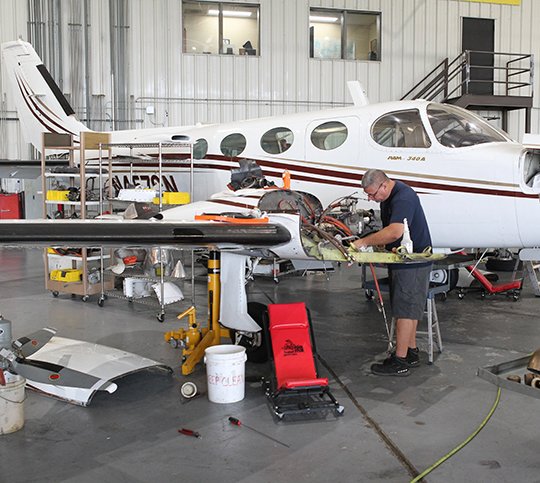Airborne Flying Service has been supporting emergency services throughout Arkansas for 30 years.
Primarily specializing in fixed-wing air ambulance service, Airborne's operations stretch to LifeNet in Texarkana and providing medical flight service in Little Rock with a seasoned team of employees who have previously served across various industries.
According to Mark Lovett, vice president of ground operations, there are several aspects to the operation. Airborne brings commerce into the community and assists other companies in various services.
"Some of the stuff that a lot of people don't know is they don't realize that our business exists, the type of business that we have, much less that it's based here," Lovett said. "A lot of people see the helicopters, they see a crash on the highway. ... They don't realize that taking your loved one from a faraway hospital to a better facility is done with a fixed-wing airplane.
"Or if they're in Nebraska and they have an issue that they go get them and bring them back. That gets them home, especially for the holidays. Obviously, the maintenance is here and we can work on just about every aircraft. We're not quite to the commercial side, the large commercial things. Most of these guys have done that, that's just not an avenue that we're chasing yet."
Airborne has contracted with U.S. Forest Service and assists with fighting fires on national forests across the United States, according to Sean Walters, AFS chief pilot.
"We provide both aircraft and pilots to perform basically an airborne taxi service," he said.
Walters said the company serves two main functions for the Forest Service -- as an airborne platform to get ATGS and emergency personnel on the ground to fight forest fires, and to train new ATGS personnel how to communicate with those on the ground.
Business Manager J.B. Kirk said the relationship with the Forest Service works well for Airborne in the same way that providing aircraft maintenance services does.
"We don't maintain everything, but if we maintain it for our fleet, then we'll do some maintenance on it for other people," he said. "You'll see different private pilots bring their airplanes in here for their annuals, change a tire, change a battery. If there's a breakdown on a ramp then we'll go over and take care of that. So those are just because we're here, we're working ... it keeps us kind of engaged in the airport community.
"The reason the Forest Service works is because it's nice filler work," he said. "It gives us another place to put some people in, but you couldn't be doing Forest Service if you weren't doing the other things. Same thing with maintenance, if we didn't already have a pretty big fleet to maintain, getting into maintenance wouldn't necessarily make a lot of sense."
According to Kirk, the business prides itself on being veteran-owned, which was started in 1988 by Jolly Higdon, a Vietnam veteran. Many of the company's administrators have military backgrounds, he said.
Kirk said they are proud of the fact their president and medical director, Dr. Wayne Lyle, also has a background as a pilot.
"He was an engineering student and he actually was working as an engineer before he decided to go to med school," he said. "He paid his way through med school by flying airplanes at night. He was flying cargo and he was flying turbine engine aircraft so he wasn't just a weekend pilot, he was a no-kidding, do it for money pilot."
Kirk said he and Mac Armstrong, safety advocate and chairman of the AFS board of directors, have worked in maintenance and planning for many airlines since 2005 and have brought their knowledge of building response plans to this fleet.
"What we're really concerned about is safety and that's where we come from," he said. "We want it to be low-key. We want our guys to really put safety first and make sure that the patient is comfortable and that they're well cared for.
"This is a high consequence industry. We need to be very, very careful. That's the thing that we get up and worry about every day is being careful and taking care of people."
Local on 09/16/2018